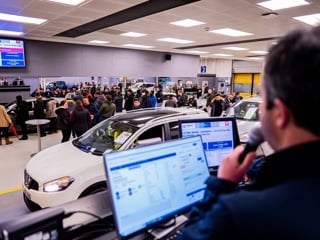One in 14 used cars under five years old have mileages falsified, new analysis by vehicle history checking company CarVertical suggests.
The act of 'clocking', which was prevalent in the days of analogue vehicle odometers that were simple to wind back, has become more common thanks to new tech and easy access to mileage adjustment services online.
The increase in mileage-related finance arrangements such as hire purchase and personal contract purchase have also played a part with drivers more likely to consider finding ways to alter the digital odometer in their car to avoid costly penalties for exceeding mileage allowances in their contracts.
Falsely lowering a used vehicle’s mileage can inflate its sale price by as much as 25% and can also lead to much higher maintenance costs, as clocked cars that have been driven more miles than it appears will have also sustained more wear and tear.
One to five-year-old Nissans are the most commonly clocked nearly-new vehicle, with almost a fifth (18.9%) of them checked by CarVertical showing a discrepancy between their odometer and recorded mileage.
Renault (16.1%) was the next most common brand for clocked nearly-new cars, followed by Peugeot (15.8%) and Kia (11.9%) – see full list below.
Britain’s top 10 most clocked nearly-new cars
|
Rank |
Make and model |
Proportion found to be clocked |
|
1 |
Nissan |
18.9% |
|
2 |
Renault |
16.1% |
|
3 |
Peugeot |
15.8% |
|
4 |
Kia |
11.9% |
|
5 |
Citroën |
11.7% |
|
6 |
Audi |
10.5% |
|
7 |
Opel |
8.5% |
|
8 |
Porsche |
7.4% |
|
9 |
Volkswagen |
7.4% |
|
10 |
Land Rover |
6.8% |
Source: CarVertical
Overall, 9.6% of cars checked on CarVertical over the past 12 months to September were found to be clocked.
With around 1.8 million used cars changing hands each quarter in 2023, the data company claims that around 690,000 drivers are at risk of becoming a victim of mileage fraud this year alone.
CarVertical’s data shows that the average one-year-old used car has 20,742 miles on the clock. Three-year-old cars have been driven for 32,111 miles on average, with five-year-old vehicles travelling for 48,629 miles.
Matas Buzelis, car expert at CarVertical, said: “A lot of drivers might think buying a newer used car which has had fewer owners and miles on the road is a safer bet. But buying a newer vehicle doesn’t eliminate the risks of getting a car with clocked mileage or hidden defects.
“Some new car buyers purchase vehicles and agree not to exceed a certain mileage so they can get better financing or lower their monthly rates. However, fraudulent drivers ignore these agreements and roll the odometer readings back so it appears they complied with the contract they signed.”
Buzelis explained: “Any car that has been driven for many more miles than it appears will have more wear and tear and are more at risk of mechanical problems.
“They will also not be worth as much money — potentially leaving the new owner out of pocket if they try to sell it later.
“A car’s mileage is a crucial determining factor of how much it’s really worth.”
Used car dealers who reduce the mileage on a vehicle for financial gain can be prosecuted under the Consumer Regulation Act.


























Login to comment
Comments
No comments have been made yet.